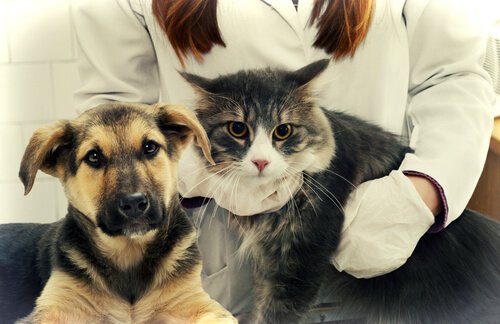Why is Preventive Care Important for Pets?

It’s easy to get swept up in routine and a busy life and forget about some of the important things. One of those things is getting check-ups, whether from your dentist or your doctor. If you forget to do it for yourself, you might be forgetting for your pets too. That’s right, pets need check-ups, too: preventive care is necessary for all living creatures.
Remembering that can also help prevent all kinds of illnesses and health problems. Keep reading to learn more about the benefits of preventive care.
What is preventive care?
For anyone who isn’t clear on what exactly this is, preventive care is basically that: trying to prevent health problems. But what exactly does that mean when it comes to pets?

- Vet check-ups twice a year. If you can’t manage twice a year, you have to get your pet at least one check-up a year. It doesn’t matter if your dog is healthy, you should always be on the watch for problems. The best way for you to do that is by taking it to the vet.
- Feeling its skin. Spend a few minutes every week rubbing your pet. If you have a dog or cat, it will love the extra love, and it’s also a way for you to see if it has any issues like cuts, parasites, or lumps that could be as harmless as fat, or as severe as tumors.
- Check its fur. Your pet’s fur can hide away all kinds of bacteria, so it’s good to spend a few minutes every few days looking closely at it to make sure it doesn’t have any major issues. You don’t need to set aside too much time, just a few minutes at night while you’re on the couch together already, for example.
Besides that, your vet will do some tests related to dental health, behavior, worms, and anything else they think is necessary.
The point of preventive care
Even though our bodies (and our pets’) are made in a way that they tell us when something is wrong, there are still some cases where problems go unnoticed. This is why it’s so important to take your pets to the vet every so often. It’s for the sake of their health, and could even save their life.
For example, a vet can help with things like:
- Worms: did you know there are some that can actually be fatal? This isn’t something you should treat as minor, even if it seems that way at the time.
- Oral problems: your dog could have gum disease, a similar illness, or even an infection. Think about it: they eat all kinds of things, even if they’re inside most of the day. A small wound in their mouth could lead to a bad infection.
- Nutritional deficiencies: they’ll weigh your pet to see if it’s anemic and do some general observation to see if it has any diet-related deficiencies. That means you’ll also find out if your dog is under or overweight, and be able to take the necessary steps.
- Vaccines: these are vital to preventing serious illnesses that could be fatal for your pet. If you take your pets to the vet regularly, they’ll be able to tell you which ones your pet needs, and might recommend you give them one, even if it’s not 100% necessary.
- Behavioral problems: you might not notice it, but it’s possible your dog is experiencing some unusual changes to its behavior for unknown reasons. Vets have a deep knowledge of animal nature, and are much more likely to be able to spot changes like that. From there, they can also give you tips on how to deal with it.
Loving your pets

Having a pet is about much more than giving it shelter, food, water, and taking it out every once in a while. You also have to care for it and keep it healthy. That’s exactly what preventive care is for.
Don’t neglect your pets. They give you their love, and would do anything for you. Doesn’t that make you want to spare a bit of your time and money for the sake of their health and happiness? Well then, preventive care is your best way to do that.
It’s easy to get swept up in routine and a busy life and forget about some of the important things. One of those things is getting check-ups, whether from your dentist or your doctor. If you forget to do it for yourself, you might be forgetting for your pets too. That’s right, pets need check-ups, too: preventive care is necessary for all living creatures.
Remembering that can also help prevent all kinds of illnesses and health problems. Keep reading to learn more about the benefits of preventive care.
What is preventive care?
For anyone who isn’t clear on what exactly this is, preventive care is basically that: trying to prevent health problems. But what exactly does that mean when it comes to pets?

- Vet check-ups twice a year. If you can’t manage twice a year, you have to get your pet at least one check-up a year. It doesn’t matter if your dog is healthy, you should always be on the watch for problems. The best way for you to do that is by taking it to the vet.
- Feeling its skin. Spend a few minutes every week rubbing your pet. If you have a dog or cat, it will love the extra love, and it’s also a way for you to see if it has any issues like cuts, parasites, or lumps that could be as harmless as fat, or as severe as tumors.
- Check its fur. Your pet’s fur can hide away all kinds of bacteria, so it’s good to spend a few minutes every few days looking closely at it to make sure it doesn’t have any major issues. You don’t need to set aside too much time, just a few minutes at night while you’re on the couch together already, for example.
Besides that, your vet will do some tests related to dental health, behavior, worms, and anything else they think is necessary.
The point of preventive care
Even though our bodies (and our pets’) are made in a way that they tell us when something is wrong, there are still some cases where problems go unnoticed. This is why it’s so important to take your pets to the vet every so often. It’s for the sake of their health, and could even save their life.
For example, a vet can help with things like:
- Worms: did you know there are some that can actually be fatal? This isn’t something you should treat as minor, even if it seems that way at the time.
- Oral problems: your dog could have gum disease, a similar illness, or even an infection. Think about it: they eat all kinds of things, even if they’re inside most of the day. A small wound in their mouth could lead to a bad infection.
- Nutritional deficiencies: they’ll weigh your pet to see if it’s anemic and do some general observation to see if it has any diet-related deficiencies. That means you’ll also find out if your dog is under or overweight, and be able to take the necessary steps.
- Vaccines: these are vital to preventing serious illnesses that could be fatal for your pet. If you take your pets to the vet regularly, they’ll be able to tell you which ones your pet needs, and might recommend you give them one, even if it’s not 100% necessary.
- Behavioral problems: you might not notice it, but it’s possible your dog is experiencing some unusual changes to its behavior for unknown reasons. Vets have a deep knowledge of animal nature, and are much more likely to be able to spot changes like that. From there, they can also give you tips on how to deal with it.
Loving your pets

Having a pet is about much more than giving it shelter, food, water, and taking it out every once in a while. You also have to care for it and keep it healthy. That’s exactly what preventive care is for.
Don’t neglect your pets. They give you their love, and would do anything for you. Doesn’t that make you want to spare a bit of your time and money for the sake of their health and happiness? Well then, preventive care is your best way to do that.
This text is provided for informational purposes only and does not replace consultation with a professional. If in doubt, consult your specialist.








